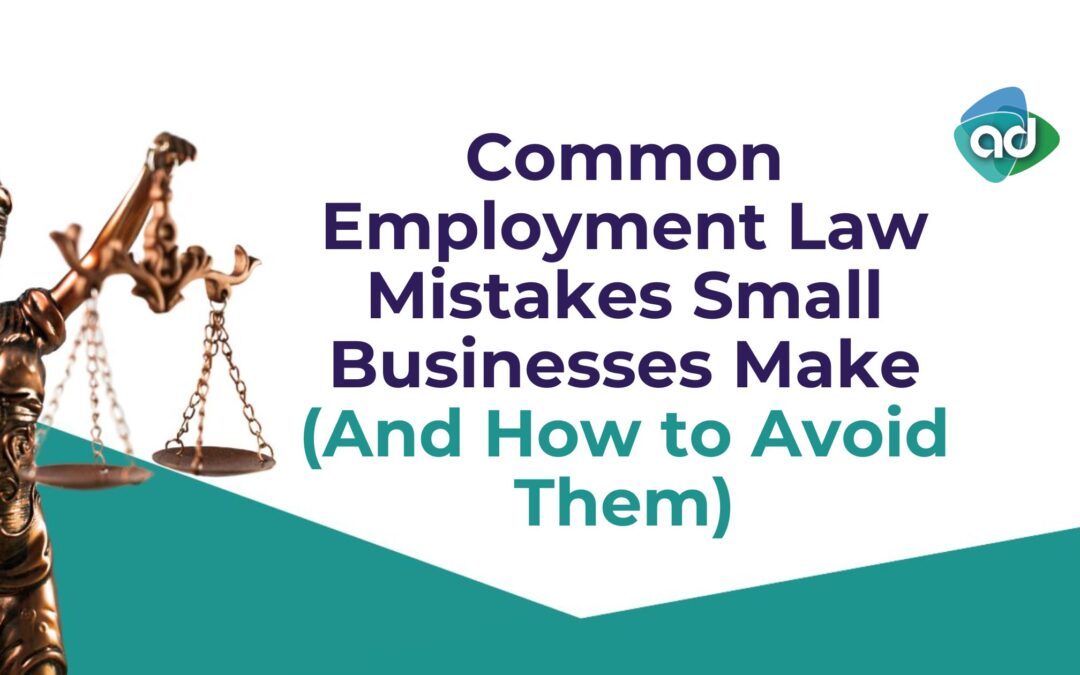Employment law can be a minefield for small businesses. Navigating complex regulations while staying focused on daily operations can be challenging.
Yet, even minor mistakes in employment practices can lead to costly disputes, fines, and damage to your business’s reputation.
At AD Legal, we understand the unique challenges small businesses face, and we’re here to help you stay compliant and avoid common pitfalls.
Here’s a look at some frequent employment law mistakes and practical steps to avoid them.
1. Misclassifying Employees and Independent Contractors
One of the most common mistakes small businesses make is misclassifying workers as independent contractors when they should be employees.
This error often stems from the misconception that classifying someone as a contractor reduces tax obligations and simplifies paperwork.
However, the distinction between an employee and an independent contractor is legally significant and determined by factors such as the level of control, nature of work, and financial arrangement.
How to Avoid It:
- Review each role carefully to understand whether it qualifies as employment or self-employment under UK law.
- Consult with a legal professional to ensure your classifications are correct and meet HMRC requirements.
- If in doubt, consider consulting the HMRC Employment Status Manual for more guidance.
2. Overlooking Employment Contracts and Written Terms
Another frequent mistake is neglecting to provide employees with a written contract. Under UK law, employees must receive a written statement of terms (such as job role, pay, and working hours) within two months of starting their employment.
Failure to provide this can lead to legal issues, especially if disputes arise.
How to Avoid It:
- Draft a clear and legally compliant employment contract for every new hire.
- Regularly review and update contracts to ensure they reflect current roles and responsibilities.
- Include essential information, including job title, salary, working hours, and notice period.
3. Failing to Keep Up with Minimum Wage Regulations
Minimum wage requirements in the UK change annually, and failure to comply can result in substantial penalties.
Many businesses unintentionally fall behind on these updates, particularly with younger workers or apprentices, who may have specific wage requirements.
How to Avoid It:
- Stay informed on the latest National Minimum Wage and National Living Wage rates.
- Conduct regular audits of payroll to ensure all employees are receiving the appropriate rate.
- Adjust wages promptly when new rates come into effect each April.
4. Mismanaging Employee Dismissals
Improperly handling employee dismissals can lead to claims for unfair dismissal, discrimination, or wrongful termination. Some businesses fail to follow fair procedures, while others may overlook offering an appeal process.
How to Avoid It:
- Familiarise yourself with fair dismissal procedures, which include establishing a valid reason, following a fair process, and documenting each step.
- Offer employees the right to appeal and address grievances before finalising any dismissal.
- Seek legal advice before dismissing employees, especially if the situation is complex or if there’s potential for a dispute.
5. Ignoring Employee Rights to Sick Leave and Holiday Pay
Small businesses often overlook the specifics of statutory sick pay (SSP) and holiday entitlements, assuming they can adjust policies at their discretion.
However, every employee in the UK is entitled to a minimum amount of paid holiday and may also be eligible for SSP.
How to Avoid It:
- Ensure your policies are compliant with UK laws on statutory sick pay and holiday entitlements.
- Inform employees of their rights and provide clear policies in writing.
- Keep accurate records of leave requests and sick pay to demonstrate compliance.
6. Lacking a Workplace Grievance Procedure
Failing to establish a formal grievance procedure can lead to internal disputes escalating into legal issues. All businesses, regardless of size, should have a clear process that employees can follow to raise concerns.
How to Avoid It:
- Create a grievance procedure document that outlines how employees can report issues and how these will be addressed.
- Train managers to handle grievances fairly, consistently, and promptly.
- Review and update your grievance procedure regularly to keep up with any legal changes or best practices.
7. Not Maintaining Accurate Employment Records
Accurate record-keeping is critical for tracking hours, pay, leave, and performance.
Failure to maintain these records can lead to compliance issues, especially if there are disputes over wages or working hours.
How to Avoid It:
- Keep comprehensive records of all employee-related documents, including contracts, timesheets, payroll, and performance reviews.
- Use a secure, organised system for managing records, and ensure they’re accessible when needed.
- Review records regularly to ensure compliance with data protection laws, such as the General Data Protection Regulation (GDPR).
8. Overlooking the Importance of Health and Safety
Health and safety regulations apply to all businesses, regardless of size. Failing to assess and manage workplace risks can lead to accidents, injuries, and legal action from employees.
How to Avoid It:
- Conduct regular health and safety risk assessments and address potential hazards.
- Ensure all employees receive adequate health and safety training relevant to their roles.
- Keep a record of all assessments, and update them regularly to remain compliant.
Staying Compliant with AD Legal
Employment law doesn’t have to be overwhelming. By avoiding these common mistakes, you can protect your business from potential disputes and costly penalties.
At AD Legal, we specialise in helping small businesses stay compliant with employment laws, offering guidance on everything from contract drafting to handling dismissals.
Ready to protect your business? Contact AD Legal today for expert advice and tailored solutions that fit your business’s unique needs. Let us help you navigate employment law with confidence.
Staying informed and proactive with these areas of employment law will help your business run smoothly and protect it from unnecessary risk. For more detailed guidance, explore our services at AD Legal.
